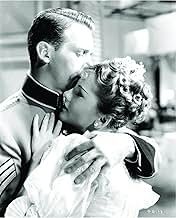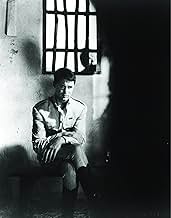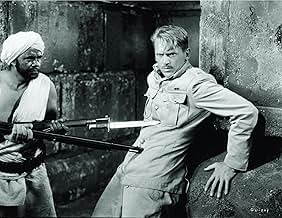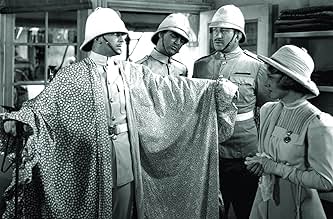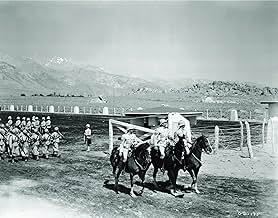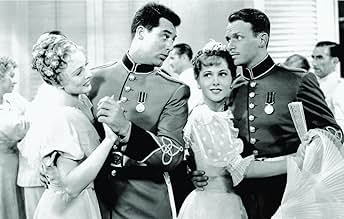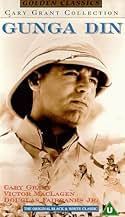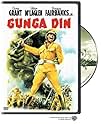IMDb-BEWERTUNG
7,2/10
13.310
IHRE BEWERTUNG
Im Indien des 19. Jahrhunderts müssen drei britische Soldaten und ein einheimischer Wasserträger eine geheime Massenwiederbelebung des mörderischen Thuggee-Kults stoppen, bevor er im ganzen ... Alles lesenIm Indien des 19. Jahrhunderts müssen drei britische Soldaten und ein einheimischer Wasserträger eine geheime Massenwiederbelebung des mörderischen Thuggee-Kults stoppen, bevor er im ganzen Land wüten kann.Im Indien des 19. Jahrhunderts müssen drei britische Soldaten und ein einheimischer Wasserträger eine geheime Massenwiederbelebung des mörderischen Thuggee-Kults stoppen, bevor er im ganzen Land wüten kann.
- Auszeichnungen
- 4 wins total
Charles Bennett
- Telegraph Operator
- (Nicht genannt)
Gene Coogan
- Lancer
- (Nicht genannt)
Jimmy Dime
- Thug
- (Nicht genannt)
George Du Count
- Pandu Lal
- (Nicht genannt)
Anna May the Elephant
- Elephant
- (Nicht genannt)
Empfohlene Bewertungen
This movie was one of my favorites when I was growing up, and so when I bought the VHS tape a few months ago I was somewhat apprehensive about watching it again. I thought that maybe my memory of the film was a little sugar coated.
I was; however, pleasantly surprised to find that I still loved watching it as much as I did when I was a kid. It's a great action adventure movie. A previous reviewer commented on the lack of sophistication the movie conveys.
Whoever that guy is, he needs to lighten up. It's hard to look at for example the special effects and cinematography in an action adventure movie such as this when compared to the special effects and cinematography of Crouching Tiger Hidden Dragon. Time's have changed, and movies with them. If you keep that in mind while watching this film, and have a good time with it you'll love this movie.
I would love to see this come out on DVD, it's a great movie.
I was; however, pleasantly surprised to find that I still loved watching it as much as I did when I was a kid. It's a great action adventure movie. A previous reviewer commented on the lack of sophistication the movie conveys.
Whoever that guy is, he needs to lighten up. It's hard to look at for example the special effects and cinematography in an action adventure movie such as this when compared to the special effects and cinematography of Crouching Tiger Hidden Dragon. Time's have changed, and movies with them. If you keep that in mind while watching this film, and have a good time with it you'll love this movie.
I would love to see this come out on DVD, it's a great movie.
This old film just has some important elements the bulk of current films seem to lack: strength of character, genuine heroism and an understanding of what true altruism and sacrifice mean. And Sam Jaffe, a terrific (now-unfortunately-deceased) character actor breaks the viewer's heart as the "regimental bhisti, Gunga Din," who takes constant abuse and gives his all, including his life, to carry water to the men of the Queen's regiment even in the thick of battle.
Funny, I don't remember it as a comedy, though I think there may have been some spots of humor in it, but then, I was rather young the last time I saw it on the Late, Late Show... too many years ago to even want to think about.
It's a wonderful movie and I hope the animated version, coming out next year, does the poem and story the same good service the 1939 film managed to do.
Highly recommended.
Funny, I don't remember it as a comedy, though I think there may have been some spots of humor in it, but then, I was rather young the last time I saw it on the Late, Late Show... too many years ago to even want to think about.
It's a wonderful movie and I hope the animated version, coming out next year, does the poem and story the same good service the 1939 film managed to do.
Highly recommended.
10slokes
Anyone with a young boy in the house who won't watch black & white movies should put this on their television set. When the child walks by, wondering what all the on screen shouting and shooting's about, tell him this is a picture for adults and that he isn't big enough to watch it yet. That'll hold him there for a few minutes; director George Stevens and his team will keep him to the end.
I think my father did that to me, anyway, and I'm the better man for it. This classic adventure yarn, set in India during the British occupation, features a trio of Army sergeants who find their tight union facing dissolution as one prepares to marry his sweetheart. Help arrives in the form of a vicious Thuggie revolt that the soldiers find themselves united against.
"Gunga Din" was one of the great movies to come out of Hollywood's finest year, 1939. Even more than most great movies from that Golden year, it is entertaining in a very immediate and accessible way. The theme music is instant hummable nirvana. While shot in California, the camera work (the only thing in "Gunga Din" that got so much as an Oscar nomination) has a windblown grandeur that feels very much like the Raj of a hundred years before. The battle scenes are shot in a very realistic manner, not too violent but very messy as people fall and shoot and run in all corners of each frame in a way that feels real, not staged like some Cecil B. DeMille Biblical slaughter fest.
The script doesn't just set up action scenes, it also develops the relationship of the three sergeants with great dollops of humor. The main focus is on Sgt. Cutter, chasing after tall tales of golden treasures. It's a rare actioner for Cary Grant, and his lightness is just right for a film that never takes itself seriously even as it develops taut suspense.
Anchoring the trio is Sgt. MacChesney (Victor McLaglen), who dotes over his elephant Annie and tries to protect Cutter from his own hare-brained schemes. He's just as funny in his own way, leaving Sgt. Ballantine (Douglas Fairbanks Jr., displaying some nice Errol Flynnish dash) as the one with the love interest and grounding enough to know he needs to chuck his boyish pals and grow up.
If "Gunga Din" was a Lifetime movie, it would be about Joan Fontaine's efforts to save her man from his two loser friends and their skull crushing hijinks. But since it's a guys' film, the accent here is on how the threesome must stay together and save Ballantine from a fate worse than death, not only marriage, but as Cutter indignantly exclaims several times, the tea business, too.
The political correctness police are hard on this film, not so much for the gender issue but the idea of British soldiers saving poor Indians from the vicious Thuggies. It reeks of colonial apologia. Thankfully, this film was made back when, and the producers thus felt no need to spell out the obvious liberalism at the heart of the film, that these three sergeants, so full of derring-do and false racial pride, have to be saved along with the rest of their army by a humble bhisti that only one of the three had any time for when he sought their approval. After all, for all their swashbuckling glory, the film's true sacrifice involves the title character, played so heart-wrenchingly by Sam Jaffe.
Back when this film was made, movie mogul Jack Warner had a saying: You want to send a message, use Western Union. Still, it seems like the messages were flying fast and furious in "Gunga Din." I watch the film now and wonder if audiences back then were meant to wonder what Gunga Din was really up to when he led Cutter to the golden temple. Was he really plotting revenge against his British overlords? Would he have been justified in doing so, especially given MacChesney's cold treatment of him? When Col. Weed delivers that eulogy, the poem by Rudyard Kipling on which the film is loosely based, was it with a nod in the direction of imperialism's folly, of lording it over someone who proved "a better man than I am" in the end? What did they make of the Guru's great speech, delivered in perfect clipped English: "You have sworn an oath as soldiers to maybe die for a faith, which is your country, England. Well, I can die for my country and my faith as readily as you...India, farewell."
Of course, the same character also instructs his brutal followers: "Kill for the love of killing! Kill for the love of Kali! Kill! Kill! Kill!" Which means we are allowed to hate him and root for the British, and save the questions about what it all means for later.
What "Gunga Din" means to me, most of all, is the quickest, surest 90-minute thrill ride on video. Cutter never found his golden temple, but there's one for all of us watching "Gunga Din."
I think my father did that to me, anyway, and I'm the better man for it. This classic adventure yarn, set in India during the British occupation, features a trio of Army sergeants who find their tight union facing dissolution as one prepares to marry his sweetheart. Help arrives in the form of a vicious Thuggie revolt that the soldiers find themselves united against.
"Gunga Din" was one of the great movies to come out of Hollywood's finest year, 1939. Even more than most great movies from that Golden year, it is entertaining in a very immediate and accessible way. The theme music is instant hummable nirvana. While shot in California, the camera work (the only thing in "Gunga Din" that got so much as an Oscar nomination) has a windblown grandeur that feels very much like the Raj of a hundred years before. The battle scenes are shot in a very realistic manner, not too violent but very messy as people fall and shoot and run in all corners of each frame in a way that feels real, not staged like some Cecil B. DeMille Biblical slaughter fest.
The script doesn't just set up action scenes, it also develops the relationship of the three sergeants with great dollops of humor. The main focus is on Sgt. Cutter, chasing after tall tales of golden treasures. It's a rare actioner for Cary Grant, and his lightness is just right for a film that never takes itself seriously even as it develops taut suspense.
Anchoring the trio is Sgt. MacChesney (Victor McLaglen), who dotes over his elephant Annie and tries to protect Cutter from his own hare-brained schemes. He's just as funny in his own way, leaving Sgt. Ballantine (Douglas Fairbanks Jr., displaying some nice Errol Flynnish dash) as the one with the love interest and grounding enough to know he needs to chuck his boyish pals and grow up.
If "Gunga Din" was a Lifetime movie, it would be about Joan Fontaine's efforts to save her man from his two loser friends and their skull crushing hijinks. But since it's a guys' film, the accent here is on how the threesome must stay together and save Ballantine from a fate worse than death, not only marriage, but as Cutter indignantly exclaims several times, the tea business, too.
The political correctness police are hard on this film, not so much for the gender issue but the idea of British soldiers saving poor Indians from the vicious Thuggies. It reeks of colonial apologia. Thankfully, this film was made back when, and the producers thus felt no need to spell out the obvious liberalism at the heart of the film, that these three sergeants, so full of derring-do and false racial pride, have to be saved along with the rest of their army by a humble bhisti that only one of the three had any time for when he sought their approval. After all, for all their swashbuckling glory, the film's true sacrifice involves the title character, played so heart-wrenchingly by Sam Jaffe.
Back when this film was made, movie mogul Jack Warner had a saying: You want to send a message, use Western Union. Still, it seems like the messages were flying fast and furious in "Gunga Din." I watch the film now and wonder if audiences back then were meant to wonder what Gunga Din was really up to when he led Cutter to the golden temple. Was he really plotting revenge against his British overlords? Would he have been justified in doing so, especially given MacChesney's cold treatment of him? When Col. Weed delivers that eulogy, the poem by Rudyard Kipling on which the film is loosely based, was it with a nod in the direction of imperialism's folly, of lording it over someone who proved "a better man than I am" in the end? What did they make of the Guru's great speech, delivered in perfect clipped English: "You have sworn an oath as soldiers to maybe die for a faith, which is your country, England. Well, I can die for my country and my faith as readily as you...India, farewell."
Of course, the same character also instructs his brutal followers: "Kill for the love of killing! Kill for the love of Kali! Kill! Kill! Kill!" Which means we are allowed to hate him and root for the British, and save the questions about what it all means for later.
What "Gunga Din" means to me, most of all, is the quickest, surest 90-minute thrill ride on video. Cutter never found his golden temple, but there's one for all of us watching "Gunga Din."
Among my father's favorite movies that I remember were High Noon, Four Feathers (both Korda's and the silent version), and this one. Not surprisingly they've all become favorites of mine. They are certainly the "guy flicks" of their day that wouldn't stand a chance of being made that way today. But I guess that's what makes them classics never to be forgotten, because, although all are classic stories, destined to be told again and again, they'll never be recreated in the original ways that made them classics.
Gunga Din has it all, and all, although dated and unapologetically un-PC, great stuff. To all the on target comments written about this movie, let me just add, the scenes leading up to and including the final battle are among the most moving in cinema. A gem of a movie. I can't hear the stir of (undeservedly unappreciated and maligned) bagpipes without remembering the thrill of this picture. It's timeless and wonderful.
Gunga Din has it all, and all, although dated and unapologetically un-PC, great stuff. To all the on target comments written about this movie, let me just add, the scenes leading up to and including the final battle are among the most moving in cinema. A gem of a movie. I can't hear the stir of (undeservedly unappreciated and maligned) bagpipes without remembering the thrill of this picture. It's timeless and wonderful.
In the most general of terms Gunga Din not only qualifies as a classic but more or less defines the term "classic" in every respect. I wouldn't know how to fault this film, as it succeeds on every level.
You begin with a workable idea for a story. Then you follow that up with superb script writing, direction and photography, and wonderful performances by the entire cast. The end result of that collaboration of successful effort is, as it must be . . . a classic.
And not only does Gunga Din succeed as a mere action adventure, which would be impressive enough, but it's comedic relief serves as a virtual workshop for aspiring directors who, lamentably today, just don't seem to get that part of the equation in all too many cases--you know, as in movie-making is an art? Or at least it used to be.
There's seems to be a gap in our society's culture when it comes to the enjoyment of art which attempts to communicate on various intellectual levels. I would put this down to dubious education all around if I had to pick just one culprit, but I don't know, maybe that's too simplistic. I experience fear, though, when I read negative comments from viewers of films as rich in various, and to me obvious, qualities as is Gunga Din. All I hear in these cases, at best, is a fundamental lack of artistic appreciation at base.
Well, for these people I imagine that all that's left is to simply go out and buy the cheap remakes of the classic films, which are, of course, a dime a dozen nowadays. And then I suppose they will get what they need: presumably a package of questionable casting, incompetent direction, in many instances virtually no attempt at intelligent character development whatsoever, along with x-many minutes of gratuitous violence and endless smash-ups, replete, of course, with plenty of LFE icing for this new-age filmic cake.
Meanwhile, I hope that my daughter will come to appreciate the great films such as Gunga Din for the classic productions they were upon release, and which they certainly remain today.
You begin with a workable idea for a story. Then you follow that up with superb script writing, direction and photography, and wonderful performances by the entire cast. The end result of that collaboration of successful effort is, as it must be . . . a classic.
And not only does Gunga Din succeed as a mere action adventure, which would be impressive enough, but it's comedic relief serves as a virtual workshop for aspiring directors who, lamentably today, just don't seem to get that part of the equation in all too many cases--you know, as in movie-making is an art? Or at least it used to be.
There's seems to be a gap in our society's culture when it comes to the enjoyment of art which attempts to communicate on various intellectual levels. I would put this down to dubious education all around if I had to pick just one culprit, but I don't know, maybe that's too simplistic. I experience fear, though, when I read negative comments from viewers of films as rich in various, and to me obvious, qualities as is Gunga Din. All I hear in these cases, at best, is a fundamental lack of artistic appreciation at base.
Well, for these people I imagine that all that's left is to simply go out and buy the cheap remakes of the classic films, which are, of course, a dime a dozen nowadays. And then I suppose they will get what they need: presumably a package of questionable casting, incompetent direction, in many instances virtually no attempt at intelligent character development whatsoever, along with x-many minutes of gratuitous violence and endless smash-ups, replete, of course, with plenty of LFE icing for this new-age filmic cake.
Meanwhile, I hope that my daughter will come to appreciate the great films such as Gunga Din for the classic productions they were upon release, and which they certainly remain today.
Wusstest du schon
- WissenswertesThe gong in the title sequence is the same one used to summon King Kong six years earlier.
- PatzerBallantine and MacChesney are bound and gagged when the last Thuggee is about to behead them after Gunga Din sounds the alarm. Cutter shoots the Thuggee and Ballantine and MacChesney are unbound as they rush to Cutter's side.
- Crazy CreditsThe credits appear on a gong. Standing next to the gong is a Hindu man, and every time he strikes the gong, the credits change.
- Alternative VersionenGerman theatrical version was cut by approx. 12 minutes. This version was later shown on TV but never released on any home media format. Only in 2018 the film was released on DVD, with approx. 4 minutes restored.
- VerbindungenFeatured in Blick zurück im Zorn (1959)
Top-Auswahl
Melde dich zum Bewerten an und greife auf die Watchlist für personalisierte Empfehlungen zu.
- How long is Gunga Din?Powered by Alexa
Details
Box Office
- Budget
- 1.910.000 $ (geschätzt)
- Laufzeit1 Stunde 57 Minuten
- Farbe
- Seitenverhältnis
- 1.37 : 1
Zu dieser Seite beitragen
Bearbeitung vorschlagen oder fehlenden Inhalt hinzufügen



